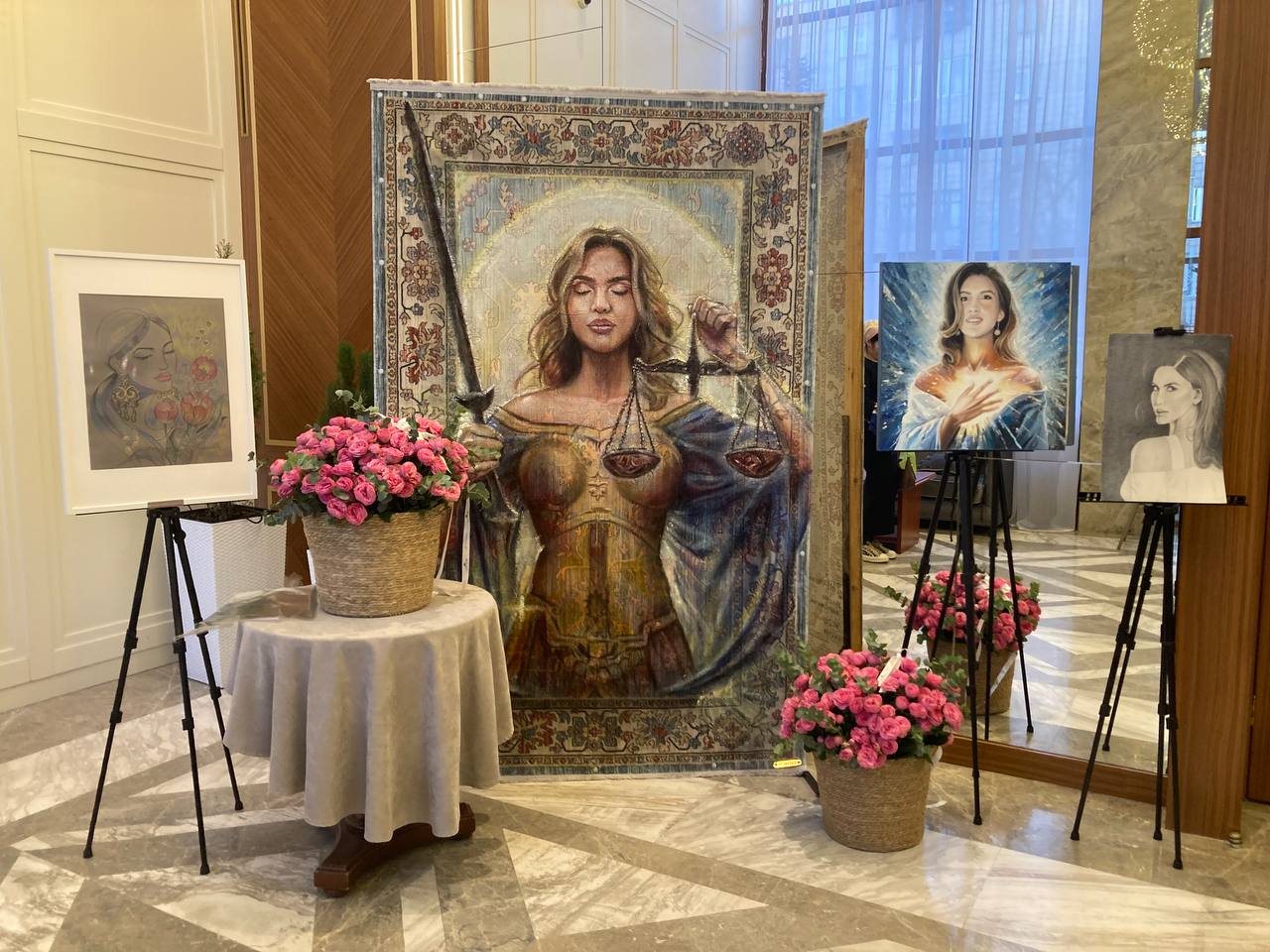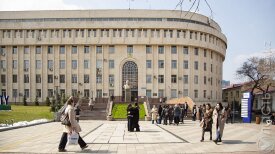"Have you ever seen Friends? This place was like Central Perk for me and Salta," Aitbek Amangeldi explains why he chose this particular bistro in Kazakhstan's capital Astana for our conversation. "This year, I didn't really feel like celebrating my birthday. So I just came here and ordered two glasses of wine, one for me and one for Salta."
But his younger sister could not be there this time. On November 9, 2023, Saltanat Nukenova, 31, was brutally murdered by her husband, former minister of economy Kuandyk Bishimbayev. Footage from the restaurant in Astana where the murder took place shows the man hitting, kicking and dragging Saltanat by her hair. The ambulance was called too late: By the time help arrived, Saltanat was already dead.
Bishimbayev’s trial was the first to be streamed in Kazakhstan. “Some people said it was like watching a TV series,” Amangeldi said. Bishimbayev was found guilty of torture and murder with extreme cruelty and was eventually sentenced to 24 years in prison.
Although the case shocked Kazakhstan, it was not an isolated incident: Data from the interior ministry showed that in 2023 the police received more than 99,000 reports of domestic violence.
After Saltanat
“I believe that God Almighty wanted Saltanat to save the lives of other women at the cost of her own life,” MP Zhanna Asanova said in an interview.
A number of legislative amendments this past spring reinstated domestic violence as a criminal offense. It had been decriminalized in 2017. The amendment became known as the “Saltanat Law”. Yet, many of the adopted changes focus on protecting the life and health of children. For example, pedophilia is now punished with a life sentence, while new penalties were introduced for beating children with particular cruelty, or bullying and cyberbullying against minors.
“A healthy family is the key to the health of the entire planet,” says Asanova. “I always say that perpetrators do not appear out of nowhere. They are unfortunate people who have not learned the good and have not been taught not to hurt the weak. If we raise children in such conditions, tomorrow we will have the same kind of rapists, murderers and violent criminals. And if we raise healthy children, then tomorrow we will all have a better future,” the politician assures.
At a crisis center in the southern city of Shymkent we met 32-year-old Lana (name changed), who lives there with her son, Alan (name changed). At four months old, he is the youngest resident of the home, which offers a total of 70 places for women and children in need, 50 of them for victims of domestic violence. Each person in need can live here for up to six months. There are seldom unoccupied rooms at this crisis center.
Lana and Alan's father were together for several years and also had a two-year-old daughter together. Lana’s ex persuaded her to stop working and take care of the household, while he would take care of the family. He came up short, however, and she gradually ran out of money. She ultimately decided to separate when it became clear that he was still officially married to his ex-wife. Lana moved in with her mother, where she discovered that she was pregnant again.
Every day, Alan's father would sit outside their house, waiting for their return. Afraid of his reaction, Lana decided to seek help at the crisis center. Lana also left her older son under her mother’s care, because she does not want the boy to live at the center, surrounded by victims of domestic violence, who often share their horrific experiences.
Lana is not celebrating the Saltanat Law.
"As long as there is corruption in our country, no law will work," she said.
Plus, the amendment still does not recognize many forms of violence. Because her ex did not commit physical violence against her, Lana did not have grounds to sue him. Other forms of violence, such as stalking, economic violence or even rape within a relationship, do not constitute grounds for prosecution.
"There is no sexual assault in the family. Once they are husband and wife, or a man and a woman in a relationship together, there is no [rape]."
Lana does not yet know where she and her children will go when their time at the crisis center runs out. She hopes to be able to leave Shymkent.
"Here in the south there is still this mentality," explains Lana, "that it doesn't matter what your partner does. People tell you: So what? Just carry on living, it's nothing bad, we’ve also been through this."
Only if she manages to leave the south will she be able to get her life back in order, Lana hopes.
A Long Way to Go
For Kazakhstan’s 20 million inhabitants, only 69 active crisis centers are active, and 22 of them have their own emergency shelters.
“Kazakhstan’s government has adopted a new law that allows the opening of state family support centers, where people who [feel threatened] in their family can receive help and protection,” assures Asanova. “Their establishment will depend, among other things, on next year's budget.”
But the director of the Shymkent-based NGO Sana Sezim, Shakhnoza Khassanova, also sees other problems, not just financial ones. The decision to open a new center will not depend on the central authority, but on the regional authority: "They can decide that we do not have a problem with domestic violence, that we do not need it, and then such a center will not see the light."
According to Khassanova, the existing centers are often not adapted to the needs of people with disabilities, and there is a lack of specialists who are qualified to care for women with mental disabilities, for example. Sana Sezim's clients also include migrants and undocumented people, who often are unaware of their rights. Sometimes even the officials do not know. "In some cases, the police or some of the aid centers still work according to the rules of the old law," Khassanova said in an interview.
Therefore, in addition to providing emergency aid to those in need, Sana Sezim is also involved in training local authorities. At a workshop recently organized for local representatives of the police, crisis centers, and health care workers, it became clear that there was no consensus on whether crisis centers are also obliged to accept migrant women, for example.
"In Kazakhstan, both the public and the state structures need to be educated," says Khassanova.
Adiya, a 22-year-old political science student at a university in Astana and activist for women’s rights, agrees.
"Women in Kazakhstan are not only oppressed in the family, but also by the system," she explained in an interview.
A group she leads is involved in the fight against harassment. When she experienced harassment by a former student at the university, the institution would not take action against him because the man was officially no longer part of the student body.
"Activism at the university is very similar to activism in the outside world. You try to stand up for something you think is right, but the administration doesn't want to change the status quo. It uses all the tools it has to keep everything as it is," Adiya said.
From her perspective, Saltanat's murder was a turning point for many.
"My parents knew that I was involved in feminist initiatives. But they didn't fully understand what that meant, because feminism is often understood here as hatred of men," she said.
"After Saltanat's death, my mother, whose political activity until then had been limited to voting, started talking and reading about violence and inequality. And she noticed things that existed in her own marriage and discussed them with my father in order to change them.”
For many, however, the future is outside Kazakhstan. Adiya is thinking of going abroad, specifically citing security reasons. According to her, the change in the law came about not only due to social pressure, but also because Kazakhstan was being watched by the world after Saltanat's murder.
“Shortly before the new law was passed, feminist organizations were not given permission to hold a march on March 8,” Adiya said. “The new laws were not introduced out of concern for the population, but for the outside perception of Kazakhstan."
"In Kazakhstan, it is very important what others think of you. We call this uyat, shame. These are a kind of 'truths' that are not written down anywhere, but are very limiting for society," explains Aitbek.
After Saltanat's death, he built a network of volunteers, including lawyers and psychologists. The Saltanat Foundation already has more than 3,000 volunteers and has helped more than 1,300 victims of violence.
"I want justice in our country to be accessible to everyone. Even today, we witness systematic problems. In some cases, it just takes a video call. When the police officers see my face, their attitude towards the victims changes," Aitbek said.
Michalina Kowol is a multimedia journalist, graduate of the Polish School of Reportage. She works for Polish and international media, focusing mostly on social and environmental issues.
Поддержите журналистику, которой доверяют.









